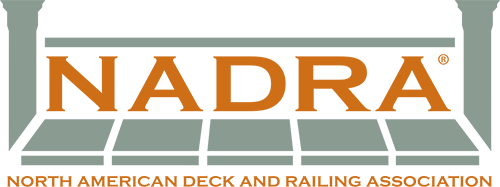February 2019
By Glenn Mathewson
Thanks to the support of NADRA members we have shared our knowledge with others in the campfire discussions regarding deck code proposals for the 2021 International Residential Code. There were 9 proposals submitted with our assistance and approval. The Deck Code Coalition is an informal group of generous professionals from a variety of backgrounds. Led by the steadfast efforts of Mr. Charles Banjai, a now retired code official and long-time contributor to code development, NADRA was able to work with these professionals toward well-developed deck codes. While some disagreement remains and some is yet to be decided, it appears the majority of these proposals have broad support. Here is a brief rundown of what was submitted.
- Decking spans for single-span and two-span conditions.
- Ledger, joist, and beam design tables up to 50, 60 & 70 psf snow loads.
- Beam cantilever wording corrected. Mostly clerical.
- Relocation of footing depth and frost protection provisions. Mostly clerical, so interpretation can be more consistent and understood.
- Separates guards and handrails on the load table so future, more appropriate, minimum design loads can be determined for each independently.
- Provisions requiring guard post attachment to be secured to adjacent members in the deck framing. Sets minimum guard post at 4×4 and with no notches permitted.
- Clarifies that multi-ply beams must be fastened together.
- An adjustment factor to allow longer beam spans when the joists do not cantilever beyond the beam and for various distances of cantilever. This will allow more flexible use of the beam span table.
- Add an appendix for guard post connection details and for future provisions regarding specific deck designs.
While this milestone in the code development process is exciting, it’s just the beginning. Anyone can submit a proposal and there are plenty of people interested in decks. Here are the next steps:
- On March 4th ICC will publish all of the proposed changes. Previous years leave expectations at well over a thousand pages of proposals to review for deck-related provisions.
- Once identified, the membership will need to decide. What’s good, what needs work, what is dangerous?
- Research and communication with others follows.
- Then reaching out to the proponents of topics of concern to share and discuss, in hopes that agreement and compromise for better code can be achieved before the hearing.
- Before the Albuquerque hearings this May, testimony has to be prepared in hope as the winning words for the committee.
- After these preparations, the hearing will commence and it will end, and the committee results will be published.
- Next, all the research and networking will happen again as public comments are prepared and submitted.
- This is only to be followed by all the public comments being published and the review of all the surprises will begin again.
- Finally, all will conclude at the final hearings in October 2019.
If you are in the decking industry, we need your help. The ideas are being discussed and the rules are being made. You shouldn’t stand on the sidelines any longer. We need you in the game. There are two ways you can help in a big way.
1. Offer your time: To volunteer time, please email Info@NADRA.org and we will work with you and the code committee to see how we can best utilize your skills – most likely, helping to review the proposals in March.
2. Offer your monetary support: To contribute to the fundraising initiative, follow this link here to see what our goal and how the funds are being used to keep this effort moving forward.



